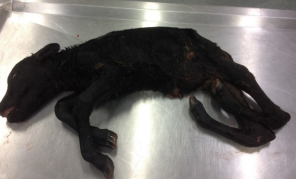February 2025
Schmallenberg
After many flocks experiencing significant problems last year we hope that Schmallenberg will be much less of a problem this year due to an increased level of immunity in the UK flock. Nevertheless we suggest that you make yourselves aware of the clinical signs and utilise the free testing if you are concerned.
What are the signs? The key signs are: - Malformations observed in the lambs, including bent limbs, fixed joints, brain deformities and spinal cord damage - Contracted tendons (flexed legs) and fixed joints in live lambs - Lambs born with neurological signs e.g. ‘dummy’ lambs, blindness, ataxia, recumbency, unable to suck - Abortion and stillbirths - It depends when the sheep contracts the virus as to what signs are seen, sheep are most susceptible to fetal deformities on days 25-50, cattle on days 62-180. Can we test for Schmallenberg? The APHA are once again offering free testing for the virus on newborns with deformities. To take advantage of this offer farmers are being urged to contact their vet.
Blue Tongue/Foot and mouth update
Update 19 January 2025 from APHA: A case of Foot and Mouth disease has been confirmed in Germany. We have introduced an import ban on cattle, pigs and sheep from Germany to protect farmers. Livestock keepers must remain vigilant to the clinical signs of disease and practice good biosecurity. This is critical to prevent its spread.
Visit the gov.uk website and search Foot and Mouth for more information and clinical signs.
21st January 2025 update for bluetongue: The uk is in a seasonally vector low period. This means the risk of transition of blue tongue is very low.
Please be vigilant for clinical signs and also visit the gov.uk website for more information. Our area still remains in a clear zone.
Harriet has now gone on maternity leave, we would like to wish her luck with her new bundle. Sarah from accounts will be taking over Harriet’s days on a Monday and Thursday while she is away.
Reminder: Please contact the surgery before bringing any aborted lambs and placenta in for Post mortems due to pregnancies within the practice.
Arkguard
Watery Mouth is an ever-present risk for new-born lambs, particularly in indoor lambing systems. Caused by the growth of E.coli bacteria in the intestines of new-born lambs, Watery Mouth can largely be prevented by attention to good hygiene, dry bedding and sufficient good quality colostrum intake.
Since the discontinuation of Spectam (an antibiotic used as a prophylactic where lambs were considered susceptible) some alternative, non-antibiotic, products have been used. Most of these are ‘energy-boost’ products which aim to help the lamb have sufficient vigour to suckle the ewe and gain colostrum. There is a newly available product should be a step forward in the non-antibiotic prevention of Watery Mouth that contains concentrated antibodies which is delivered in a 2 ml oral dose. Antibodies are the molecules in colostrum which help prevent infection becoming established in the new-born lamb and is a sustainable non-selective way to manage risk. Where susceptible lambs receive a dose soon after birth, the gut lining is coated with protective antibodies, reinforcing the lamb’s resistance to Watery Mouth in the first 48 hours. The lamb should subsequently receive its full complement of the ewe’s colostrum as normal. This new product is called Arkguard Lamb from Forte Health.
Heptavac P alternative:
As you all know Heptavac P has not been available. An alternative vaccination protocol is possible. Bravoxin and Ovipast can be given as a single injection on the same day in different sites in place of the Heptavac booster this year. This is OFF LICENCE and we suggest you contact us to authorise use of these vaccines for your flock. Normal protocol with a single injection of Heptavac as a booster can be resumed next year.

